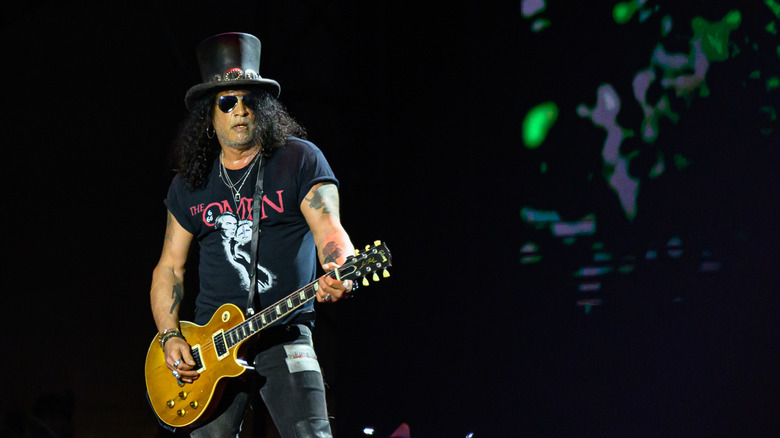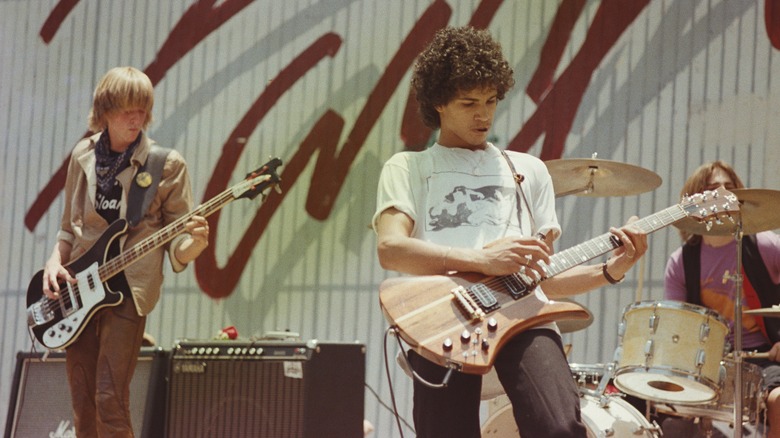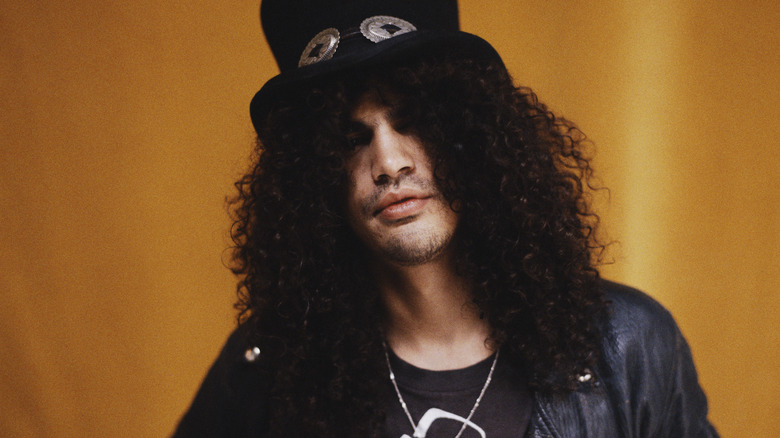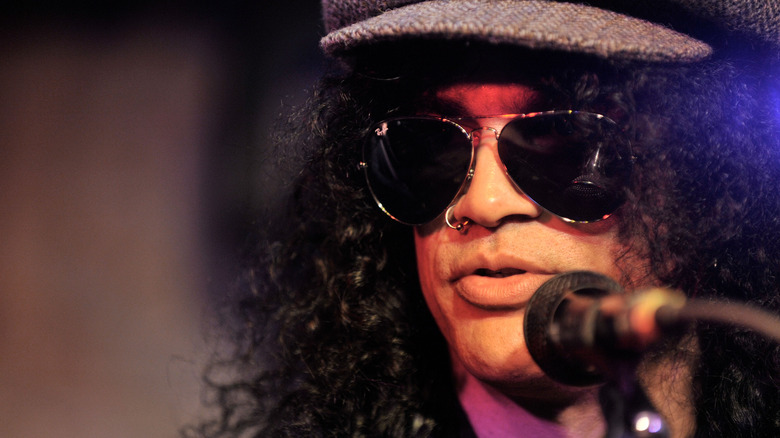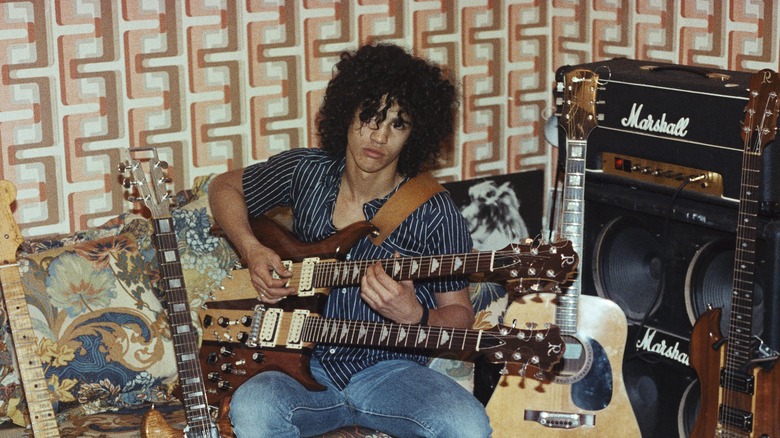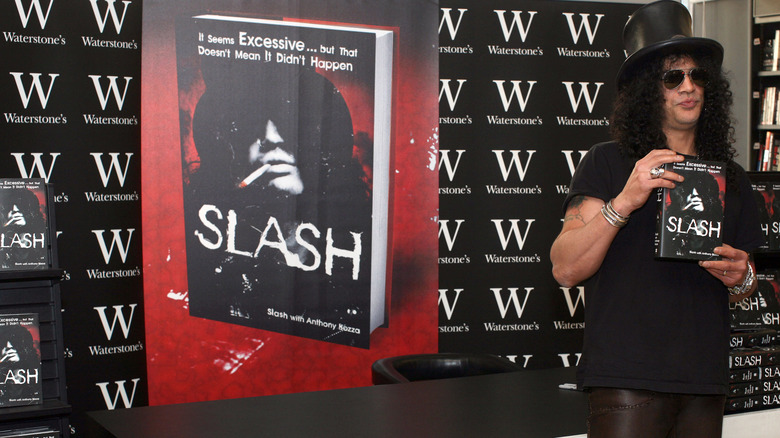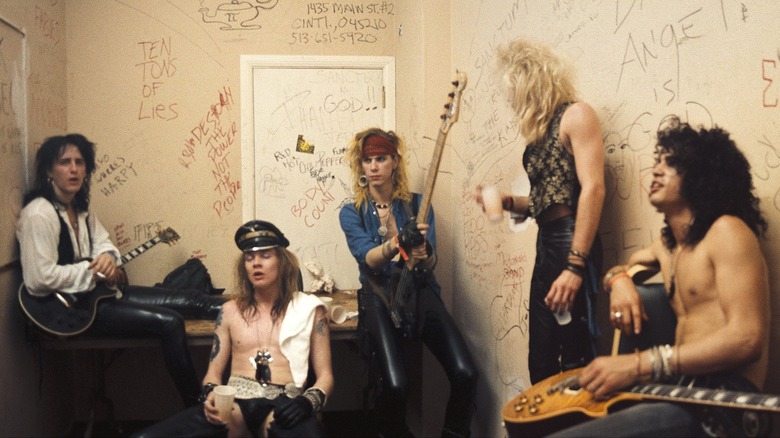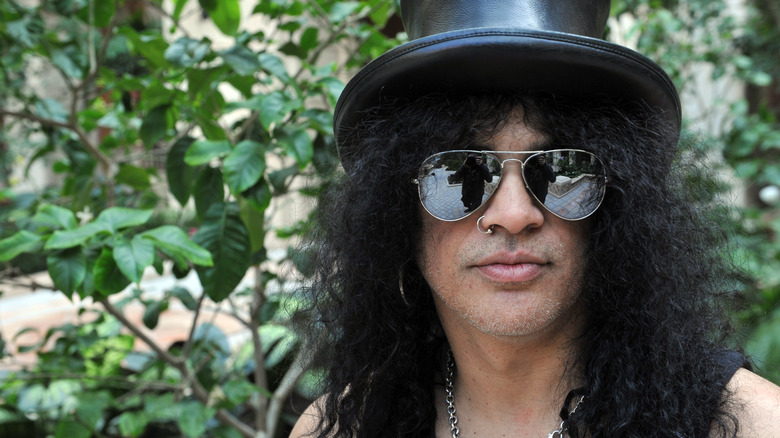The Tragedy Of Guns N' Roses Guitarist Slash Explained
Some musicians seem to have such a natural talent that it's easy to imagine that they were born with an instrument already in hand. Guns N' Roses and Velvet Revolver guitarist Slash might seem like one of those people, but in his book "Slash: The Autobiography," he wrote that he credits GN'R bandmate Steven Adler with introducing him to the idea of the guitar — and they met when they were 13 years old. But it wasn't an easy ride from then on for Slash.
Slash stresses that he started from knowing nothing, attending Fairfax Music School, and being taught the basics by a guy who "didn't look like a rock star at all." Still, the sound stuck, and within years, he was in a chart-topping band performing before legions of fans.
GN'R has had a famously contemptuous run, often defined by controversial moments that lead singer Axl Rose will never be able to leave behind him. Slash, meanwhile, has lived an almost low-key life, at least as far as rock stardom is concerned. In an interview with Louder Sound, he explained, "There's definitely moments that I have memories of that I don't savor — things that I've done ... But there's nothing catastrophic, and nothing that I would wish I could go back and fix, because it's just not realistic. I just don't believe in carrying regrets for things that happened in life that don't have a massively negative effect on somebody else." That's a very zen way of looking at things, and that's not to say that he didn't have his struggles: He definitely did.
Slash's childhood was spent feeling like an outsider
In his book "Slash: The Autobiography," Slash wrote of his troubled childhood. "Once I was twelve, I grew up fast," he wrote. "I ... stole, I got kicked out of school, and on a few occasions I would have gone to jail if I hadn't been underage. I was acting out, making my life as intense and unstable as I felt inside."
Born Saul Hudson in Hampstead, London, he earned the nickname Slash when he was in ninth grade — and it stuck. What led up to that was a distinctly bohemian start to life: His father was a British artist and his mother was a Black American costume designer (who worked with big names like Ringo Starr and David Bowie). Initially raised by his father in England, they eventually joined his mother in Los Angeles. Although he recalled fond memories of England, he also wrote that once they moved, his paternal family dropped out of his life.
After a few years in the famous Laurel Canyon, they moved to a more traditional environment. In an interview with Rolling Stone, he explained how hard it was: "When I first moved to this country, I had a really thick Northern accent. ... I just didn't fit in. At school, it was very straight white kids. But the primarily Black side of my family lives in South Central LA, and I [felt] too white. It was hard. I didn't really ever feel totally comfortable in my own skin."
His parents' divorce left long-lasting feelings of abandonment that he experienced over and over
Slash's earliest memories of growing up in California include memories of growing up in the orbit of everyone from Joni Mitchell and Glen Frey to Jim Morrison, Carly Simon, and Diana Ross — thanks to his mother's success as a costume designer. But not long after his brother, Albion, was born in 1972, his parents split.
In "Slash: The Autobiography," he wrote that it had a major impact on him. "I was devastated; the only stability I'd known was done," he shared, and went on to explain that even though the split was amicable, it still felt odd. In hindsight, Slash was candid about memories of his father's drinking — and subsequent tendency toward verbal abuse — as well as the distance that he felt developing between the members of his family. His father struggled with the split, seeing him became "intense and weird," and Slash felt that sense of loss for a long time.
"It still took me years to come to terms with the hurt. I lost a piece of who I was and had to redefine myself on my own terms. I learned a lot, but those lessons didn't help me later on when the only other family I'd known disintegrated. I saw the signs at the time, when Guns N' Roses started to come apart at the seams. ... it was every bit as hard to find my way back to my path again."
The worst day of Slash's life was the death of his best friend
Although the release of their debut album "Appetite for Destruction" should have had the entire band enjoying everything that life had to offer, those days include one that Slash described as one of the worst days of his life. It was a day when he had headed to New York, gotten a room at the Milford Plaza, and found an old friend from LA at the hotel looking for him. He had met Todd Crew — the bassist for a band called Jetboy — years prior, and when Crew showed up in New York on that fateful day in 1987, he was distraught over breaking up with his long-time girlfriend.
In his autobiography, Slash told the story of drinking, eating pizza, and taking Central Park carriage rides, which eventually escalated into heroin. He said they were around 18 hours into the day when Crew suddenly collapsed. He got him into the bathroom, was able to revive him and get him to bed, but when he stopped breathing, he called 911.
"I couldn't save him," he wrote. "Todd, all of twenty-one years old, died in my arms." When he returned to LA for the funeral, he found that everyone blamed him: "I had to deal with the finger-pointing ... so on top of the mourning, an unjust black cloud of accusation followed me around, while I'd been the one in the end who had done everything possible to keep Todd alive."
Drug misuse led to a terrifying diagnosis: Slash had six days left to live
It's no secret that rock and roll comes with an infamously hedonistic lifestyle, and in an interview with Yahoo Music, Slash explained that initially, "I got into booze and drugs mostly just to kill time. ... I'd really fall in hard when the tour was over ... And you just keep managing it, and managing it, and it takes its toll eventually. It catches up with you."
That happened when he was 35 years old, and was not only diagnosed with a form of congestive heart failure called cardiomyopathy, but was also told that he had between six days and six months left to live. He was hospitalized, and a three-inch-long defibrillator was implanted in his chest to deliver an electric shock to his heart when it started beating irregularly.
"Fifteen years of overdrinking and drug use had swollen that organ to one beat short of exploding," he wrote in "Slash: The Autobiography." It was several years before he cleaned up completely, and in a 2022 interview with Yahoo, he explained that constant work and bad memories helped him stay clean: "Every time even the idea of going in that direction popped up in my mind, it brought back such ugly memories that I've never felt really compelled to go through with it."
If you or anyone you know needs help with addiction issues, help is available. Visit the Substance Abuse and Mental Health Services Administration website or contact SAMHSA's National Helpline at 1-800-662-HELP (4357).
The lowest point in Slash's life
It's easy to fall into the habit of thinking that just because someone's famous, they've got it easy behind the scenes. That's absolutely not the case, and in an interview with The Guardian, Slash got candid: "I was at my lowest from 1996 to 2001. I left Guns N' Roses and my alcoholism was at its peak."
In an interview with Louder Sound, Slash explained a little more about what had been going on, and that this period lasted through to his 2006 sobriety. "You're having a good time and everything's great, and then ... your life just starts to spiral out of control," he said, and after adding that while he was hesitant to get into details, he did explain that conflict within GN'R, a sense of losing who he was as a musician, and his dependency on drugs and alcohol meant that his lowest point in life lasted for around a decade.
"I was going through struggles with getting sober from 2000 to 2006. There was a lot of topsy-turvy s**t going on during that time. Trying to sort your life out. That was definitely a period of unknowing. But in the nineties, if you ever felt like that you could fix it." He also shared what he had learned in hindsight: "You just have to hang in there and stay in the boat."
Slash felt pressured into writing a book to set the record straight
Slash has written a few books, including his 2007 autobiography and "The Collection: Slash," which was a look at his life through his guitars, and was published in 2023. However, it was during an interview with Louder Sound that Slash said that he had never really wanted to write a book, but that he had felt pressured to do so by necessity.
"The biggest thing that prompted me to write a book was the out-of-control reality of the internet, where people just make s**t up and stories branch out from there," he said. "That was really frustrating, because a lot of the stuff that was going on with GN'R was really off the mark."
Writing his own version of the story was a way to set the record straight, and he added that there was one other factor in his decision to write a book: the unauthorized biographies that were out there. His books became not so much about wanting to tell his story, but feeling as though he needed to.
Slash's feud with Axl Rose was the stuff of legend and misinformation that damaged other relationships
It's no secret that Slash's infamous departure from GN'R and his very public feud with front man Axl Rose is the stuff of legend, but according to Slash, it has something else in common with legend: Much of what's said just isn't true. That's partially what convinced him to write a book and tell his version of the story, and in 2007's "Slash: The Autobiography," he gave a pretty heartbreaking example of a story that was circulating in the court of public opinion, which he says never happened.
In 2006, Rose released a statement with a slew of accusations, including claims he had been forced to defend himself against attacks from both Slash and fellow GN'R alum Duff McKagan. He also included claims that the previous October, Slash had shown up at his house to essentially ask for an end to their feud, while bad-mouthing McKagan and Velvet Revolver's Scott Weiland.
In his autobiography, Slash wrote that not only was it not true — and that he hadn't spoken to Rose since 1996 — he added, "The fact of the matter is, this incident and the resulting negative effect it had on Velvet Revolver was very unsettling to me; I can barely even talk about it still. ... what hurt the most was that I had to defend myself to my band. I showed up and insisted that what was alleged wasn't true, but ... everyone seemed to think it was."
(Click here to read more about Axl Rose's tragic real-life story.)
There seems to be more to Slash's fallout with Izzy Stradlin than he's willing to talk about
Hindsight, it's often said, is 20/20. In "Slash: The Autobiography," he set the record straight on his departure from GN'R, writing, "I consider leaving GN'R one of the smartest decisions I've ever made. There's no doubt that if I'd stayed with the band under those circumstances I'd surely be dead now because of too much unnecessary drama." As far as he was concerned, the blame was not only on Axl Rose's shoulders, but the people Rose had surrounded himself with.
He also wrote that there were a few times when he and Izzy Stradlin reunited, including a two-week period where they "wrote about 12 songs that would have been the best Guns N' Roses record, hands down." In 2022, Louder Sound asked Slash why Stradlin declined to be a part of the GNR reunion. He cited some unspecified yet irreconcilable differences, and earlier in the interview, he spoke about resenting Stradlin for quitting the group in the first place.
"I was admittedly resentful of that whole trip with Izzy leaving, because ... When he quit, he was looking at us going: 'These guys are gonna f*****g die.' ... So there was a certain kind of resentment there — of not really understanding or appreciating where Izzy was coming from. In hindsight, I still sort of feel the same way, I guess, about that. ... But it's hard to really understand exactly what that was all about."
(Wondering what the ex-members of GN'R are doing today? Click here to find out.)
Slash hasn't said much about Scott Weiland's death, but acknowledges it was a heartbreaking situation
Much has been made about the real reason Scott Weiland left Stone Temple Pilots, which was that he had been asked to — for a myriad of reasons. Weiland ended up in Velvet Revolver — widely considered one of the best supergroups in history — with Slash, and according to what Slash told Kerrang! (via Blabbermouth), it was a difficult partnership that ended when they kicked him out at the end of a UK tour. "We basically didn't speak a word that whole time," Slash said. "I imagine he was quite uncomfortable. No wonder he didn't have a good time."
Confirmation of the split with Weiland came in the spring of 2008, and in a press release (via UCR), Slash confirmed that "his increasingly erratic onstage behavior and personal problems have forced us to move on." Weiland hit back, claiming in an interview that he felt wrongfully judged and persecuted by his bandmates.
Weiland died in 2015, and in a joint tribute posted to Duff McKagan's Instagram, his former band members (including Slash) wrote, "We experienced a good chunk of life with Scott, and even in his darkest times, we all had hope and love for him. .... And we grew to a big family that still remains to this day." Years later, Slash spoke about him in a Louder Sound interview. "Scott was difficult. All things considered, he was irretrievable. ... But like I said, we had some good times in that band, too."
Slash's stepdaughter died unexpectedly at 25 years old
On July 22, 2024, Slash posted a heartbreaking announcement to his Instagram. His stepdaughter, Lucy-Bleu Knight, had passed away. He described the 25-year-old as "an incredibly talented artist, a passionate dreamer, and a charming, lovable, sweet soul." As if that wasn't painful enough, the post also made it a point to ask social media to not speculate about the circumstances of her death.
Records obtained by the New York Post say that she passed away at a private residence on July 19, and three hours after her death was announced on Slash's Instagram, what appeared to be a scheduled post appeared on her own Instagram. The message — which was posted along with a selfie — read (in part): "Whether I made you feel excluded, manipulated/controlled you, ... or drowned real issues in my toxic positivity-I am sorry. ... May my soul learn to evolve from my poor job at being Lucy-Bleu."
After the completion of an autopsy, her cause of death was listed as "deferred." That essentially means that a cause of death was not immediately decided, and further investigations into the circumstances of her passing were ordered.
